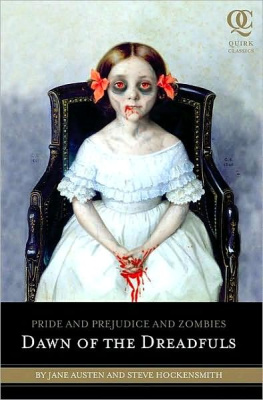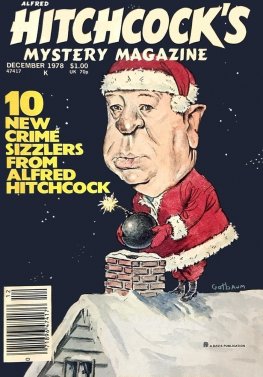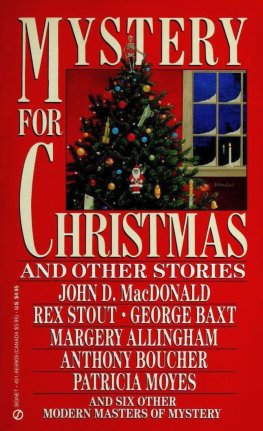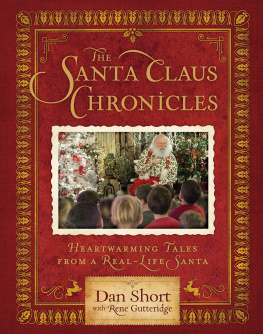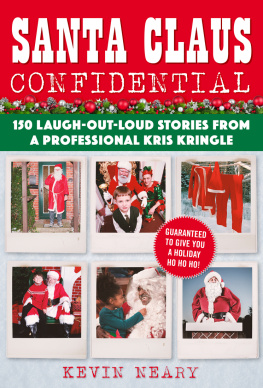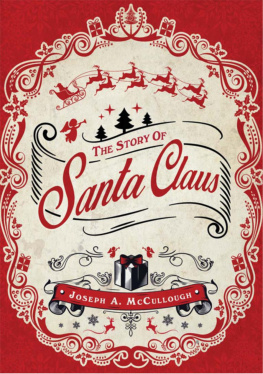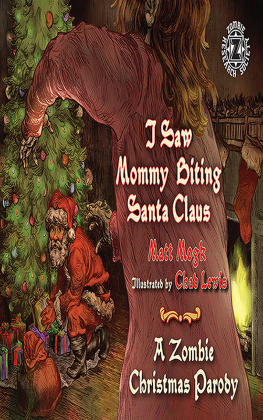
Steve Hockensmith
Naughty-Nine Tales of Christmas
2010 by Steve Hockensmith
Reading this collection, you might get the impression that I don't like Christmas. Murder, robbery, drugs, desperation-it's not very holly jolly, is it? But the truth is I love Christmas! It's my favorite time of year. That's why I keep dragging it through the mud of human degradation. There's no season I'd rather write about.
Well, that's not the only reason I've written about Christmas so often. To be honest, if Ellery Queen Mystery Magazine and Alfred Hitchcock Mystery Magazine had annual Arbor Day issues, you might be reading The Roots of All Evil: Nine Tales of Woodland Crime. Once upon a time, you see, I wrote quite a bit for EQMM and AHMM, and I learned something useful: Come May or June, when they're starting to put together their holiday issues, it's not a bad idea to shoot a Christmas story their way. Not a bad idea at all.
Every tale in this collection originally appeared in either Ellery Queen or Alfred Hitchcock, in fact. The first to be published was "I Killed Santa Claus," which popped up in EQMM 10 years ago. (I'm going out of my way to mention that to establish that the story predates both the current ubiquity of cell phones and the film Bad Santa. So there. No sniping on those fronts, if you please.) The latest (and best, in my opinion) is "Hidden Gifts," which appeared in EQMM in late 2007. I haven't written a Christmas story since then. I simply haven't had time.
The desire, though-that I've had. I still dearly love the sound of jingle bells and Christmas carols and snow crunching underfoot. Yet whenever I hear them now, I want to mix in distant sirens and screams and gunfire.
And laughter. Yours, I hope. The characters you're about to encounter might not be having happy holidays themselves, but I certainly hope yours are a little merrier for having met them.
Steve Hockensmith
Alameda, Calif.
November 2010
Ethel Queenan decided on murder when she saw Connie Sandrelli sitting on Santa's lap.
Connie was an attractive woman, if you were one of those wolves who goes in for loose blouses and tight slacks and lots of hair. And she was a young woman-just sixty-five. Ever since she moved into the Always Sunny Trailer Park in Clearwater, Florida, the men there had been falling all over each other to drive her to the grocery store, show her how to play shuffleboard, mow the lawn around her mobile home, whatever she wanted whenever she snapped her relatively wrinkle-free, non-arthritic fingers.
The problem was, there weren't enough men to go around. Each year, five or six Always Sunny wives became Always Sunny widows, while the husband-to-widower conversion rate was much slower. As a result, the competition for available men was fierce. And Santa belonged to Ethel-whether he liked it or not.
Ethel's husband Ralph had passed two years before. He died the way he'd lived-cursing and drunk. Enraged by a fourth-quarter fumble during an Indiana University football game, he threw his beer at the television, then kicked in the screen when a Kentucky linebacker ran the ball in for a touchdown. A lightning bolt of electricity ran up his Reebok and flash-fried Ralph Queenan where he stood.
Ethel considered her husband a martyr to Indiana collegiate athletics and even wrote the president of the university asking him to name a hall or a scholarship after Ralph. She never received a response. That made her so mad she threw every one of their Indiana University sweatshirts and jackets and baseball caps and plastic cups and commemorative coins and Christmas tree ornaments into Ralph's Weber grill, doused the mound with an entire can of lighter fluid and tossed in a lit match.
The resulting burst of flame singed off her eyebrows and set her neighbor's lemon tree on fire. The trailer park smelled like scorched lemon meringue pie for a month.
Despite her devotion to Ralph's memory, Ethel had been not-so-patiently waiting to replace her husband from the moment the paramedics carted away his charbroiled carcass. She'd watched with growing fury as other widows-hussies, all of them, even the ones she'd once considered friends-snatched up each new widower as soon as he came on the market.
Ethel was at a temporary disadvantage, having no eyebrows and all. But even after they grew back bushier than ever, romance continued to bloom for others, not for her. She finally took a stand, rising up at a Fourth of July barbecue to declare, "I've waited long enough! The next single man in this park is mine! Mine!"
"The next single man" turned out to be Bud Schmidt, a retired postal worker from Duluth, Minnesota. He wasn't Ethel's type. With his pale skin and concave chest and bulbous gut balanced on spindly little legs, he looked nothing whatsoever like her dream man, Ricardo Montalban. But he fit her number-one requirement well enough: He was still breathing.
There are many unwritten laws in Florida's retiree-packed trailer parks and condo associations, and one of them is the four-week rule-a month-long moratorium on courting a widow or widower after the Dearly Departed has been laid to rest. Ethel made her move on Bud the day after his wife died.
First, she brought him a cake. The next day, she brought him Jell-O salad. The day after that, it was tuna casserole. And on the fourth day, she pulled out the big guns, making her intentions clear to one and all: She brought Bud Schmidt a baked ham.
All of Always Sunny was soon abuzz about Ethel's scandalous behavior. Whenever she walked by, the men cracked wise, shouting out things like "Hey, Ethel-just so's you know, I'm a meatloaf man myself!" The women, on the other hand, would stop talking altogether, letting her pass by as silently as a snake slithering across the road.
It bothered Ethel, but it didn't stop her. Only one person's opinion mattered. And when she dropped by Bud's mobile home with a new dish every day, he seemed well, not exactly pleased, but not displeased, either. He would just smile, thank her politely and shut his door without saying the words Ethel longed to hear: "Why don't you come on in and help me eat this?" The only thing that ever changed was the size of Bud's gut, which was slowly growing from a cute little pot into a fifty-gallon tub, and Ethel's every outing ended the same way: with her shuffling back to her trailer to leaf through her Betty Crocker cookbook in search of the magic recipe that would convince The Chosen One's stomach to say "open sesame" to his heart.
Ethel had worked all the way through the Meats and Poultry sections and was just making her first cautious foray into the hitherto uncharted realm of Fish & Shellfish when Connie Sandrelli came on the scene. She was a widow from Rhode Island. She was alone. She was pretty. And, much worse, she could cook.
Chicken cacciatore. Eggplant pasta torte. Risotto. Gnocchi. Ravioli. It was a far cry from the fried chicken and chili mac and pigs in blankets that had, till then, been the backbone of Always Sunny's weekly pot-luck dinners.
Ethel found Connie's strange, gloppy-looking contributions pretentious, disquieting, unwholesome. Yet everyone else oohed and ahhed and asked for more. Especially the men. Especially the man. Bud.
"Mighty good," he said to Connie as he scooped up his third helping of lasagna in Always Sunny's "recreation hall." "My. Teee. Good."
"Why, thank you, Bud," Connie said. "I've got a whole other pan back in my trailer. I'll bring you over a plate tomorrow, if you like."
Next page

